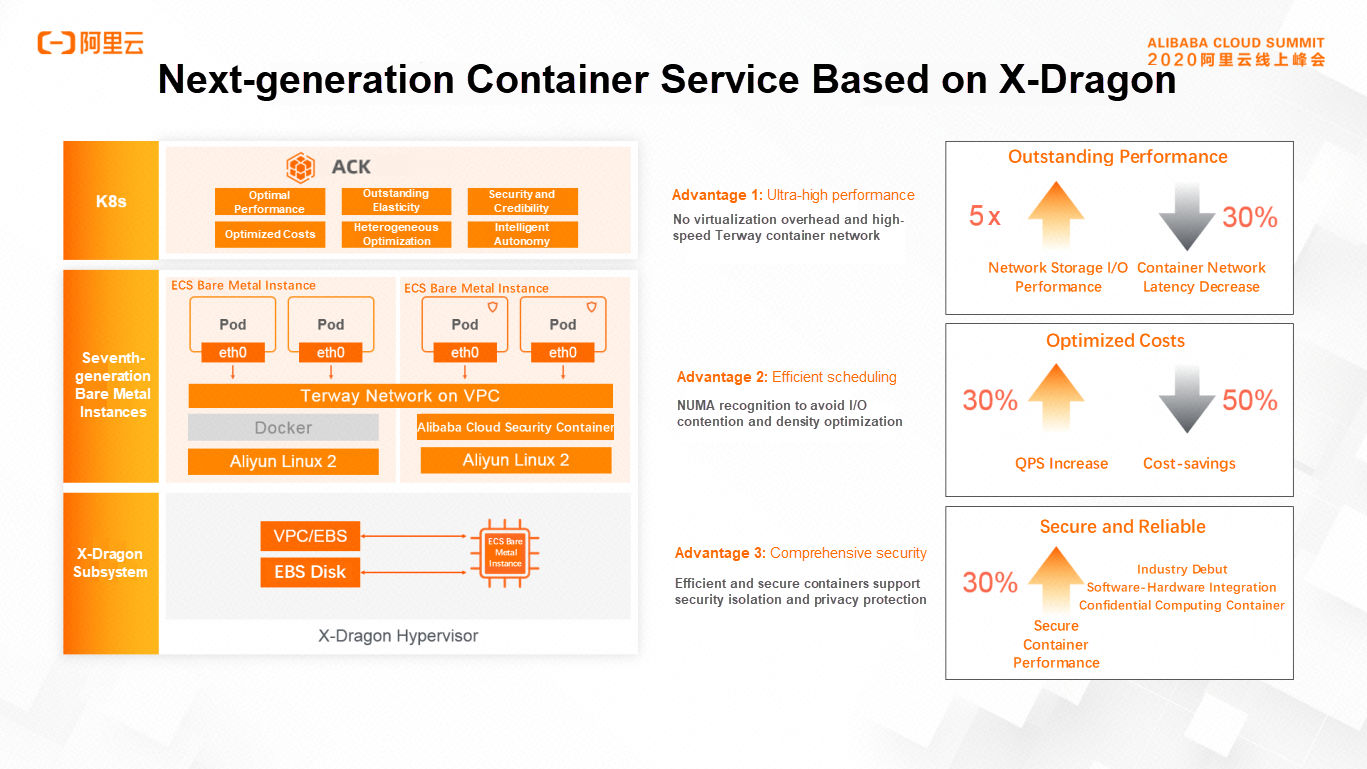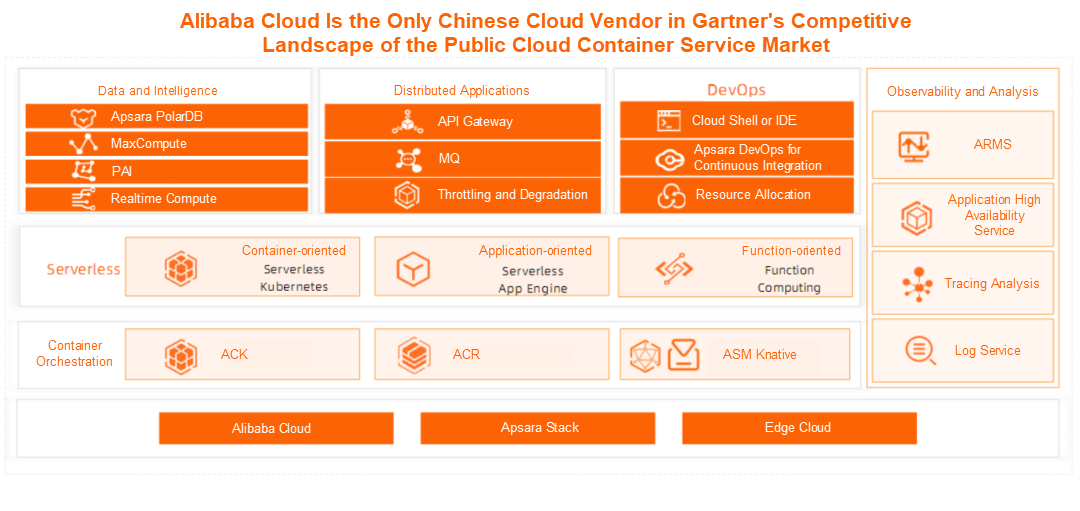By Ding Yu (Shutong), Head of Alibaba Cloud Container Platform

New technologies such as cloud computing, big data, and artificial intelligence (AI) are rapidly changing our world. Their enormous influence has shifted from quantitative changes to qualitative changes. For any enterprise to survive in today's world, they must adapt through digital transformation. According to IDC, among the world's 1,000 largest enterprises, 67% have escalated digital transformation to the level of enterprise strategy, and many Chinese enterprises are incorporating digital transformations in their core strategies. As migration to the cloud becomes the trend in the business world, it is time to make full use of open-source technologies and cloud services when constructing software services. For enterprises, embracing cloud computing and cloud-native technology and using this technology to accelerate innovation will become the keys to successful digital transformations.
At the 2020 Alibaba Cloud Online Summit, Ding Yu, a cloud-native application platform researcher with Alibaba Cloud, pointed out that "cloud-native technology, such as containers, has become the shortest path to realize the value of the cloud and empower enterprises to fully embrace cloud computing." In his view, many enterprises have invested substantial time and energy in digital transformations, but they have taken too many detours. This is because they lack an understanding of and practical experience with cloud-native technology and the support of sound technical solutions and products.
As we all know, traditional development models cannot meet the rapidly changing iteration speed, frequency, and O&M methods needs of the market. However, cloud-native technology is designed to maximize the use of technical models to maximize the productivity of cloud computing. It seeks to fuse the thinking patterns that run through application design, development, delivery, and management with best practices in the shortest time. This is what Ding Yu means by "the shortest path". Take the container technology as an example. Containers are encapsulated on top of virtualized hardware. As one of the new interfaces for interaction between the cloud platform and customers, the construction, distribution, and delivery of applications have been standardized at the container level. For enterprises, containers can reduce the costs of IT implementation and O&M to improve the efficiency of business innovation.
According to Ding Yu, "One of the core advantages of Alibaba Cloud is that Alibaba's core services run on the cloud, which is the best breeding ground of innovation. The most advanced technologies will first be tried in Alibaba's own business systems, where they must prove their versatility and value, before being rolled out on a large scale and made available to customers." Cloud-native technology has essentially carved out a shortcut for digital transformation, and enterprises should use this as an opportunity to overtake their competitors.
It has been ten years since Alibaba first adopted container technology in 2011 and set out down the path of cloud-native. This technology has endured the test of the Double 11 Shopping Festivals over the past decade. A case in point was in 2015, when the global containerization program achieved rapid and elastic scaling for the shopping festival. The ultra-large scale of the Double 11 event makes it highly complex and a great challenge to the implementation of container technology. For instance, tens of thousands of images must be released and distributed at one time through the container image distribution process. The sheer magnitude of traffic was a major challenge. To meet high demands for efficiency, Alibaba Cloud introduced P2P technology to quickly distribute images on a large scale and achieved cross-IDC image download and container startup within 10 seconds. The significant impact of container technology on Double 11 was also reflected in the implementation of hybrid deployment technologies, which helped the Alibaba Group reduce IT costs by 30%. During Double 11, we reduced the cost of every 10,000 transactions by more than 75%.
In this April, Gartner released its report on the competitive landscape in the public cloud container service market, and Alibaba cloud was once again the only Chinese vendor selected. According to Gartner's report, Alibaba Cloud Container Service is a strong performer in the Chinese market and offers a wide variety of products under a sound technology development strategy in fields such as serverless containers, service mesh, sandboxed containers, hybrid cloud, and edge cloud. In March 2020, Gartner published its annual survey report Competitive Landscape: Public Cloud Container Services for the second time. The report compares the offerings from various vendors in ten functional dimensions, including serverless Kubernetes, service mesh, and container imaging.
In recent years, container services have been widely accepted by enterprises in various industries. With the most diversified family of container products and services, Alibaba Cloud Container Service has achieved rapid annual growth of more than 400% for several consecutive years. At the 2020 Alibaba Cloud Online Summit, Jiang Jiangwei, a senior researcher from the Alibaba Cloud Intelligent Infrastructure Products Division, announced the release of the cloud-native bare metal instance solution.
The new-generation container service Alibaba Cloud Container Service for Kubernetes (ACK) fully demonstrates the powerful performance of the latest Alibaba Cloud ECS Bare Metal Instances. It features outstanding performance, efficient scheduling, and comprehensive security.

Within Alibaba, the ultra-high performance of Container Service + ECS Bare Metal Instances gave DingTalk the support it needed to cope with its largest traffic peak ever. In the past, DingTalk was completely deployed on ordinary physical machines. Since the outbreak of the COVID-19 epidemic, the demand for online collaboration among government, business, and school users has soared. The elastic deployment of cloud-based ECS Bare Metal Instances and Container Service quickly met the needs of the DingTalk business application by scaling up its capacity to 100,000 cores.
In the market, particularly under the influence of the epidemic, many enterprises need to rapidly scale out their capabilities. For example, in the online education industry, the rapid increase in demand has created both opportunities and challenges for all online education organizations. According to Li Gangjiang, CEO of Baijia Cloud, a full-service video technology provider, the company's business volume surged by dozens of times over in a short period of time at the height of the outbreak. The difficulty of rapidly resizing in a way imperceptible to its users is no less difficult than delivering a new system.
Fortunately, before it experienced this surge in traffic, Baijia Cloud had optimized its container cluster architecture and planning with the help of the Alibaba Cloud team. By using ACK and ECS Bare Metal Instances developed based on the X-Dragon architecture, the company easily coped with the traffic peak. In contrast, online education companies that had not deployed containers had no choice but to exponentially increase the number of servers when faced with an abrupt surge in users and traffic. This involved time-consuming deployment work, dramatically increased business costs, and undermined the user experience.
Why Choose the Elastic Deployment of ECS Bare Metal Instances + ACK In the case mentioned in the preceding section, Baijia Cloud needed to scale up its capacity dozens of times over, and its Kubernetes clusters had to meet rigorous performance requirements. The ECS Bare Metal + ACK solution was perfectly suited to such a high-traffic and high-concurrency scenario for the following reasons. First, Alibaba Cloud ECS Bare Metal Instance servers have high specifications and can help Baijia Cloud significantly increase the capacity of a single node.
Second, the container-based construction approach can meet the needs of fast and elastic service provisioning. ECS Bare Metal Instance servers eliminate virtualization loss and improve computing performance by 8%. Moreover, their quasi-physical-machine feature supports secondary virtualization. High-performance ECS Bare Metal instance servers and elastic containers work seamlessly together. Data shows that containers that run on ECS Bare Metal Instance servers provide 10% to 15% higher performance than those that run on physical machines. This is because the virtualization overhead is offloaded to the MOC card, and the CPU or memory of ECS Bare Metal Instance servers has zero virtualization overhead. Each container that runs on cloud-based ECS Bare Metal Instance servers has an exclusive Elastic Network Interface (ENI), which improves network throughput by 13%.
Third, ECS Bare Metal Instance servers separate the storage bandwidth from the computing bandwidth, meeting the need for massive reading and writing in Baijia Cloud's business scenarios. The adoption of an X-Dragon server solution significantly increased computing power. By using high-performance Alibaba Cloud NAS and scaling out the storage to four clusters, Baijia Cloud solved the I/O performance bottleneck.
With the preceding solution and its own large-scale cluster management capabilities, Alibaba Cloud helped Baijia Cloud effectively upgrade the original architecture solution and scale their capacity out dozens of times over in just several days. As a result, Baijia Cloud enjoyed significantly higher cluster performance and stability, allowing it to cope with the traffic peak.
Alibaba Cloud has made extensive investments in cloud-native technologies, including a wide range of container, service mesh, and serverless services. In China, Alibaba Cloud provides the largest cloud-native service family, made the most comprehensive cloud-native contributions to the open-source community, offers the widest range of cloud-native application practices, and possesses the largest cloud-native customer base. Alibaba Cloud's service family includes more than 20 services in eight categories, ranging from underlying infrastructure and data intelligence to distributed applications. This allows Alibaba Cloud to meet the needs of a variety of industry scenarios.

Alibaba Cloud is the technology company that has made the most comprehensive contribution to the open-source cloud-native community in China. It provides a wide range of services, including orchestration and scheduling, job management, and serverless frameworks, and is the lead maintainer of various prominent CNCF projects, such as etcd, containerd, and Dragonfly. To date, Alibaba Cloud has had ten projects elected into the CNCF Cloud-native Landscape. Last January, Li Xiang, a senior technical expert at Alibaba Cloud, became the first Chinese engineer to be selected as a CNCF TOC representative. He is dedicated to promoting the implementation of cloud-native technologies. This May, Alibaba made OpenYurt, the first cloud-native project for edge computing, open source in a bid to facilitate collaborative community development in the cloud-native and edge computing fields.
Recently, China Open Source Cloud Alliance (COSCL) announced the "Top 10 Excellent Cloud-native Application Cases" at the cloud-native event for OSCAR Open Source Day. STO Express's generic cloud-native computing platform and China Minsheng Bank's scenario-based data service mid-end platform, both of which were supported by Alibaba Cloud's technological solutions, were named among the 10. The four criteria used in the ranking were: digital transformation solutions for traditional industries, cloud-native technologies implemented on a large scale, improvement of resource utilization and R&D efficiency in enterprises, and empowerment of business innovation. These two cases stood out due to their outstanding performance in technical practices involving cloud-native technologies and data service mid-end platforms.
The STO Express solution provides a good example. The original IDC system enabled the company to rapidly develop its business in the early stages, but it also exposed many problems. Under the traditional IOE architecture, non-standard and unreliable system architectures and low development efficiency suppressed business development. After many technical discussions with Alibaba Cloud, STO Express finally chose us as its sole partner to provide a stable computing and data processing platform.
The original architecture adopted by STO Express was developed on the basis of the VMware + Oracle database architecture. By migrating to Alibaba Cloud, the company completed the transformation to a complete cloud-native architecture based on Kubernetes. There are two highlights in this user case.
At present, STO Express's core business system on the cloud has completely taken over the business traffic and, on a daily basis, processes tens of millions of orders and hundreds of millions of logistics tracking procedures, generates 1 TB of data, and utilizes more than 1,300 compute nodes to process business in real time. In the words of STO Express's executive in charge of migration to the cloud, "STO Express has been fully transformed by Alibaba Cloud. The cloud-native architecture based on Kubernetes has achieved remarkable results in terms of cost-saving, stability, efficiency, and business enablement. The value created by these cloud-native technologies is the core driving force behind STO Express's decision to use the public cloud as our main computing resources."
The goal of container technology is to build or produce a new foundation, new computing power, and a new ecosystem. Alibaba Cloud is dedicated to helping enterprises better implement global application delivery and distributed architectures involving hybrid clouds and cloud-edge integration. According to Gartner, more than 80% of global enterprises will adopt a hybrid cloud architecture. Alibaba Cloud is currently focusing on developing hybrid cloud and integrated cloud-edge solutions. The cloud architectures of the future will be dynamic and hybrid architectures that integrate clouds, edges, and devices. Public cloud capabilities will be extended to edge devices, and computing capabilities and AI will need to reach the edge. In this context, containers provide a consistent way to deploy and deliver applications to clouds, edges, and devices. Based on the innovative software-hardware integration technology native to the cloud, Alibaba Cloud provides powerful computing capabilities to accelerate enterprises' intelligence upgrades. Alibaba Cloud Container Service makes full use of the performance and elasticity of the X-Dragon architecture and supports the scheduling and sharing of the Hanguang 800 chips, optimizing the efficiency and reducing the costs of deep learning scenarios.
Containers, Kubernetes, and cloud-native technologies are becoming the new technical standards of the cloud era and reshaping the entire software life cycle. With cloud-native solutions, Alibaba Cloud is helping business customers and developers use the cloud to its full potential.
Cloud-Native Storage: The Cornerstone of Cloud-Native Applications
KubeVela: The Extensible App Platform based on Open Application Model and Kubernetes

666 posts | 55 followers
FollowOpenAnolis - July 14, 2022
OpenAnolis - June 15, 2022
Alibaba Developer - April 18, 2022
Alibaba Clouder - May 18, 2021
Alibaba Cloud Native Community - May 18, 2023
Alibaba Cloud Community - March 8, 2022

666 posts | 55 followers
Follow Microservices Engine (MSE)
Microservices Engine (MSE)
MSE provides a fully managed registration and configuration center, and gateway and microservices governance capabilities.
Learn More Serverless Workflow
Serverless Workflow
Visualization, O&M-free orchestration, and Coordination of Stateful Application Scenarios
Learn More Serverless Application Engine
Serverless Application Engine
Serverless Application Engine (SAE) is the world's first application-oriented serverless PaaS, providing a cost-effective and highly efficient one-stop application hosting solution.
Learn More ACK One
ACK One
Provides a control plane to allow users to manage Kubernetes clusters that run based on different infrastructure resources
Learn MoreMore Posts by Alibaba Cloud Native Community